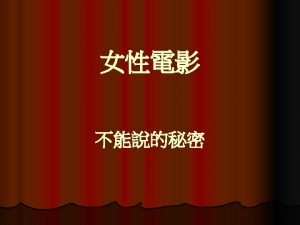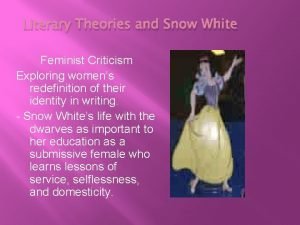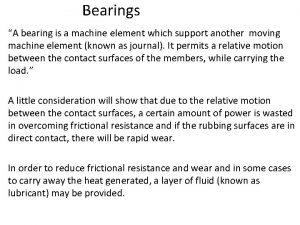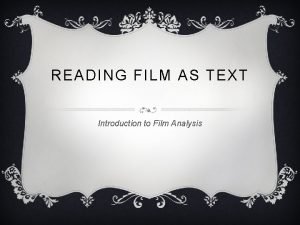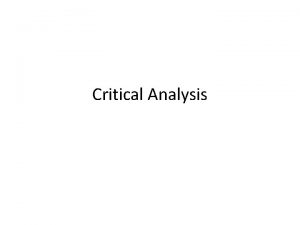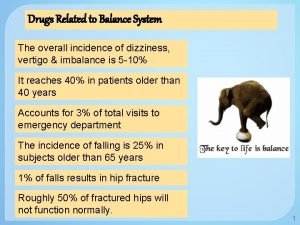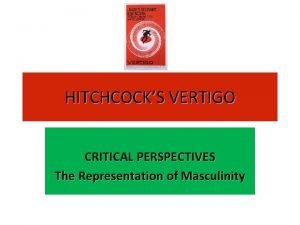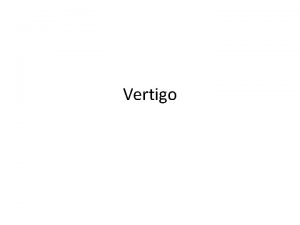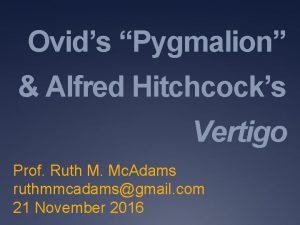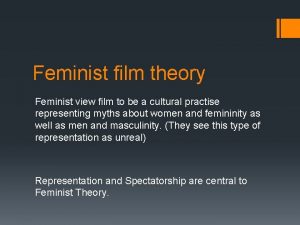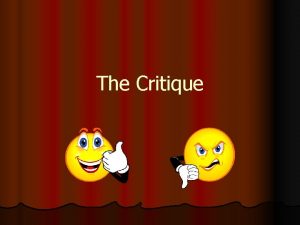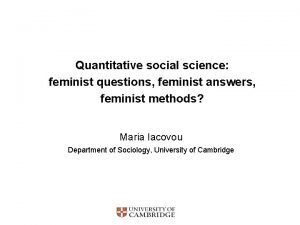HITCHCOCKS VERTIGO CRITICAL PERSPECTIVES FEMINIST CRITIQUE Feminist Film








- Slides: 8

HITCHCOCK’S VERTIGO CRITICAL PERSPECTIVES FEMINIST CRITIQUE

Feminist Film Theory • Developed in USA early 1970 s from Sociological theory • Function of women in film as result of wider stereotypes about gender roles in society – Focus is on the representation of women • Formally – through characterisation & micro-elements • Narrative – their role in the plot and position in narrative – Draws on Psychoanalytical theory • Freud / Lacan – Offers psychological, social, cultural and political critique about the way in which women are represented in Film and wider society

What is the focus of Feminist Critique? • Views cultural products as reflections of the inequality assigned to men and women within social, political and cultural life • This inequality is seen to be represented by: – – the roles of male and female characters Appearances Treatment of male and female actors/ stars Success and development of men and women in the industry • Film itself is a social institution and has a specific ideological function, that reflects wider ideology about gender roles

What is the focus of Feminist Critique? • The film industry is patriarchal – positions of power and influence are held by men. – It is from a male perspective that • scripts are chosen, • specific genres become more popular than others and • certain actors / actresses are employed. • Films often mirror the creator's own place in society, so representations in film will always reflect the experience of the writer and director. – Assumption that male directed films will objectify women, female directed films won’t (not entirely accurate) • Mainstream audiences are male

Key Feminists in Film • Laura Mulvey – Visual Pleasure and Narrative Cinema, 1975 • Robin Wood – Fear of Spying, 1983 • Marianne Keane – A closer look at Scopophilia; Mulvey, Hitchcock and Vertigo, 1986 • Tania Modleski – The women who knew too much, 1988

Key influences of Feminist criticism • Psychoanalytical – Freud • Focuses on fantasy & dreams, which are a reflection of defences, wishes & guilt expressed by conflicts in the subconscious • Believed resistance & transference is a way we cope with fantasy & dreams • Mother role fundamental to development of sub-conscious • Gender roles are learnt & based on psycho-sexual development of the individual & the society they live in – Lacan • The obsession with death – the subject of the gaze (male) & the object of the gaze (female) creates obsession & desire for the ‘thing’ or the object – The ‘thing’ becomes a replacement for our obsession with death • Woman does not exist, they are a symptom of man as a subject – women are ideal objects of male desire

Key terms of feminist film criticism • The Male Gaze – Women are represented from pov of male cameraman / director/ producer for male audience – Representation projects a male fantasy on female characters. • Scophophilia – Women in the audience have to watch these representations from the Male Gaze – They gain pleasure in looking at women on screen being adored by men • Voyeurism – Watching without being looked at – Enjoyment through watching

What is Post-feminist Critique? • Post-feminism is a development (and reaction) to radical feminist thinking of the 70 s and 80 s. • It argues that women’s roles within wider society have changed / are changing • Women can be empowered by roles & representations that Feminism traditionally considered to be restricting • It also considers the representation of men • It argues there is a female gaze


